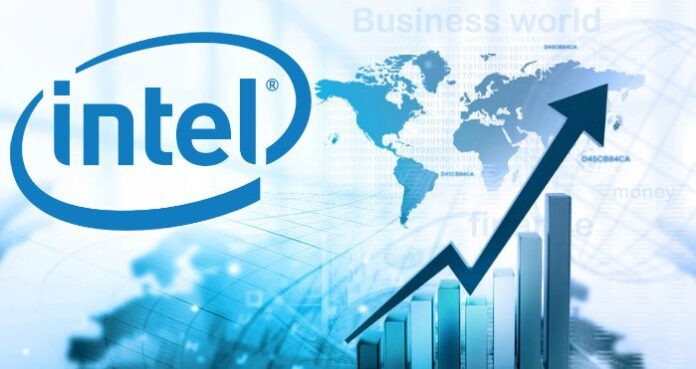Intel’s solid second quarter results topped analysts’ estimates and led to at least two upgrades and a price target increase.
Late Wednesday, the Santa Clara, Calif.,-based chipmaker notched stronger revenue for its data center, “Internet of Things” and flash memory businesses. Those results offset sluggish PC demand.
Investor’s Business Daily this week reported Ascendiant Capital Markets upgraded Intel to “hold” from “sell” and that Needham & Co. upgraded Intel to “buy” from “hold.” Meanwhile, Northland Securities boosted its price target on Intel’s stock from $31 to $32 per share. Intel’s shares closed at $29.90 on July 16. The stock has traded between $28.82 and $37.90 in the past year.
In a research note, Canaccord Genuity analyst Matthew Ramsay wrote “Whew!” when referring to Intel’s Q2 strength in data center, IoT and “particularly Nand (flash memory) sales.”
Specifically, Intel posted second-quarter earnings of 55 cents per share on revenue of $13.2 billion. Analysts had expected 50 cents per share on $13.04 billion, according to consensus estimates from Thomson Reuters.
Intel’s net income slid to $2.71 billion for the quarter, which ended June 27, from $2.8 billion a year earlier. Earnings per share, however, were flat at 55 cents, due to a fall in the number of weighted average shares outstanding. Net revenue dipped to $13.19 billion from $13.83 billion.
In a conference call, Intel said it expects the personal computer market to be weaker than previously expected for 2015. As such, it predicted that full-year guidance for revenue would fall by about 1%.
“Second-quarter results demonstrate the transformation of our business as growth in data center, memory and IoT accounted for more than 70% of our operating profit and helped offset a challenging PC market,” said Intel CEO Brian Krzanich in a press release.
Analyst Jack Gold of J. Gold Associates noted that Intel was trying to stem losses resulting from a sluggish PC market and a disappointing mobile group.
“PCs are declining and Intel’s still trying to build into the mobile side of things with tablets and smartphones,” Gold said. “It’s going to take a while.” Software and services also did not perform well with “virtually no profitability,” he noted.
On the positive side, Intel has been selling “a lot” in the cloud so its storage business has taken off faster than expected. Its IoT business has grown, recording profit that was ten times of its software and services unit despite being a much smaller business, Gold said.
“I think it’s going to be an interesting year for them,” he said. “Intel is well-positioned to weather this story better than most because they have a very diversified business.”

